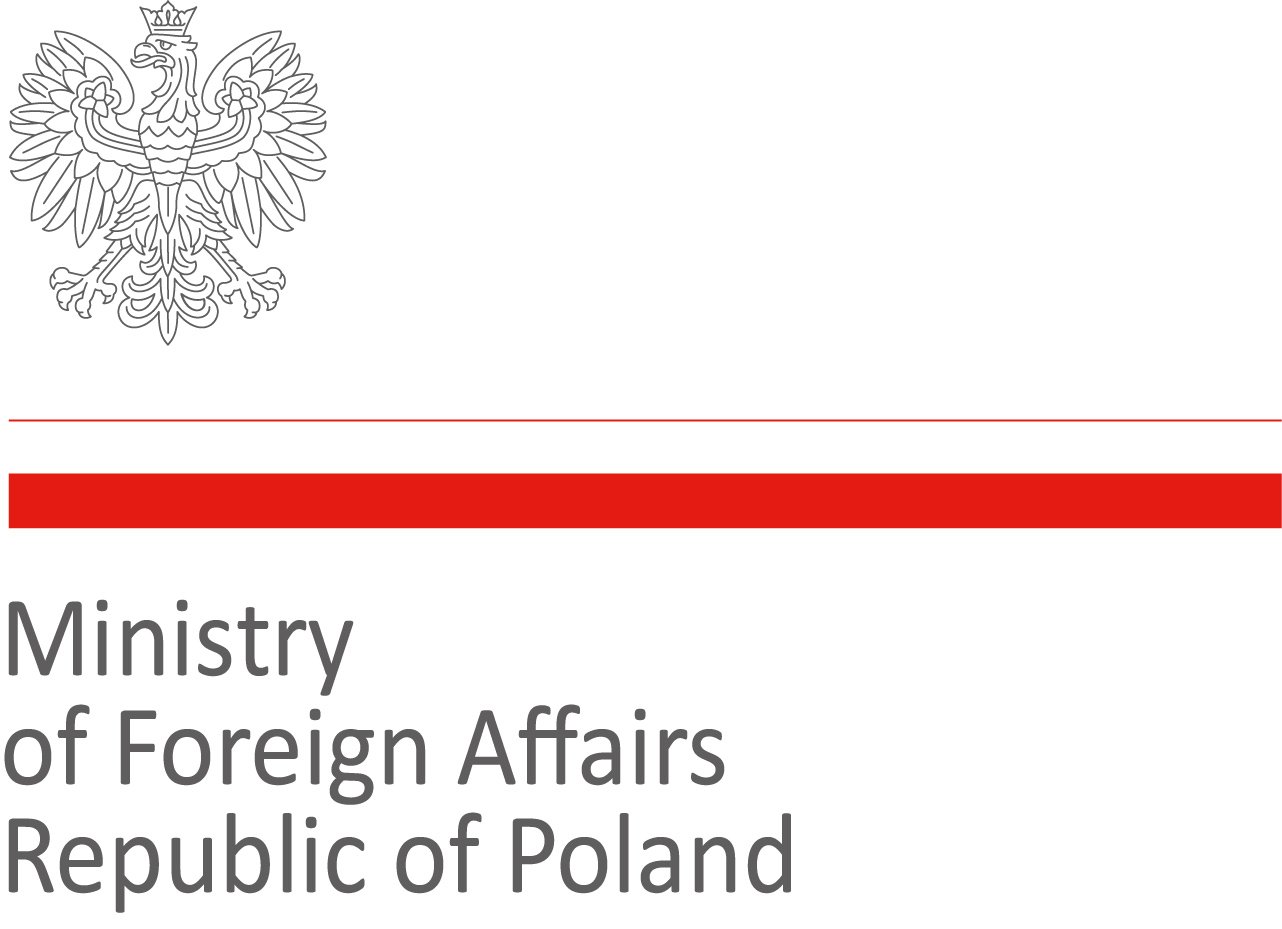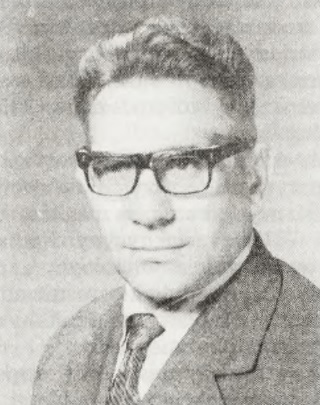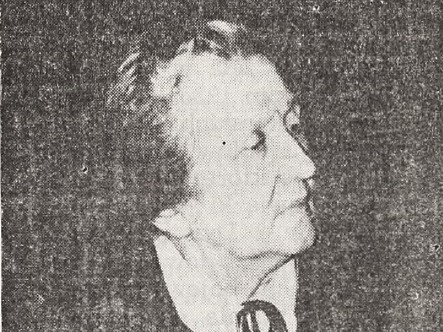Author
Jan Sikorski, b. 1917 in Petersburg, pharmacist, Auschwitz survivor (prisoner No. 19086), Mauthausen survivor.
Subject to the implacable laws of nature, the survivors of the War and the wartime occupation of Poland, along with many of the survivors of Auschwitz, are leaving us. On 1 June 1986 our colleague Nicet Franciszek Włodarski, known in Auschwitz as “Prontosil,’1 bade us his last farewell, so a short article on him will save the good he rendered unto others from anonymity.
He was born in Sokal near Płońsk on 5 December 1911, the feast day of St. Nicetius,2 and hence his Greek name, which is not a particularly popular or widespread name in Poland. However, many Polish families used to observe a general rule that a new baby was given the name of the saint on whose feast day it happened to be born. Nicet was given a second name, Franciszek, in memory of his grandfather. His father was Józef Włodatski (1870-1930), and his mother was Waleria née Zawdzka (1883-1963). Nicet was their third and youngest son. The eldest, Stanisław (b. 1903), was a professional officer in the Polish Army; Marceli, their second son (b. 1907), was a physician, like Nicet.
The Włodarski family hailed from Lithuania, but had been settled for several generations in Mazovia, in the environs of Płońsk, just like their neighbours, the Zawadzki family, who were farmers as well. Like all the Polish people in this part of the country, they had lost a lot and gone through a lot of suffering during and in the tragic aftermath of the national uprisings of 1830/21 and 1863/64.3
Nicet’s grandfather Franciszek Włodarski owned a farm of 60 hectares, and before his death split it up and shared it out between his five sons. Nicet’s father Józef sold the small farm he had inherited from his father and took up a job with an agricultural and commercial co-operative in Płońsk. In 1918, Józef and his family moved to the neighbouring town of Pułtusk, where he continued in the employ of commercial co-operatives but also worked as a property administrator.
Young Nicet went to primary school in Pułtusk and continued his education at a local grammar school. While still at school, he joined Związek Harcerstwa Polskiego, the Polish scouts’ union, devoting his youthful enthusiasm to its service and eventually being promoted to the rank of scoutmaster and instructor. His special interests focused on scout packs involved in water sports and first aid training. At the time, the water sports packs had a renowned patron, the mountaineer, writer and scoutmaster General Mariusz Zaruski.4
Nicet’s duties as an instructor in the scouting movement took him to numerous camps, tattoos and scouts’ conferences held on riverbanks and lakesides (such as Lake Wigry5). He organised children’s and young people’s holiday camps (at places like Popowo on the River Bug), and was interested in constructing kayaks and recreational boats. He dreamed of travelling around the world.
He devoted a lot of time to his hobbies and social work, but when his father died the family’s financial situation deteriorated quite substantially and it was not until 1936 that he could start his university education. He wanted to enrol for Medicine at the University of Warsaw, but had not done Latin at school, so instead he applied for Biology. By 1939 he had collected credits for all the subjects and courses needed to graduate and was busy writing his M.A. dissertation.
However, while reading Biology he never gave up his ambition to study Medicine, the discipline which was his first choice. He took a course in Latin and passed, and he also engaged in voluntary work for Towarzystwo Walki z Gruźlicą, an association involved in the prevention of tuberculosis. A paper he delivered for the Warsaw association for hygiene6 on vitamin research, which was a new and fashionable discipline at the time, made a name for him when he was still an undergraduate. He was a talented and hard-working student, which earned him acknowledgement and words of commendation from his tutors, especially Professor Kazimierz Bassalik,7 who later became a close friend of his.
Nicet was exempted from national service because of his impaired eyesight (he had to wear glasses all the time), but as soon as the War broke out he left Pułtusk, where he had been staying for the summer vacation and went to Warsaw to help with setting up first-aid scout packs as an ancillary service for the Polish Army. After the surrender of Warsaw, the German occupying authorities took over the students’ hall on Plac Narutowicza, and Nicet and his fellow students moved to a smaller facility for students on ulica Tamka. There he continued his secret work for the Polish scouts, which would soon bring the country good and praiseworthy results.8
However, the Germans did not fail to spot their activities, and on 3 June 1940 the Gestapo arrested Nicet Włodarski and his friends, rounding them up from their hall of residence in the notorious AB-Aktion9 conducted against the Polish intelligentsia and social activists. That day has gone down in the history of Warsaw as the time when many of the city’s lawyers were arrested. Nicet was the only one of his circle of friends to be interrogated on aleja Szucha,10 but he denied all the charges against him, i.e. that he was involved in the underground scouting movement. On 15 August 1940, after being held for ten weeks in Pawiak prison,11 Nicet Włodarski was put on the first train of prisoners from Warsaw to Auschwitz, which had just been opened, and was registered there as prisoner No. 1982.
He was put in various work commandos and accommodated in various blocks. Finally, in July 1941 he was sent to Block 14, and was standing near Father Maximilian Kolbe (No. 16670)12 during the historic roll call when Father Kolbe offered to take the place of another prisoner, Franciszek Gajowniczek (No. 5659), whom deputy camp commander Fritzsch had selected for death.
Thanks to help from friends, after some time Włodarski managed to get a job as a male nurse in the prisoners’ hospital. He revived his old ambition to care for the sick, which he had cultivated when he was still at home doing voluntary service for the scouts, and many of the survivors who knew him remember him as a good organiser of the hospital’s work, sympathetic to human suffering, someone they owed a lot to. He never spared any effort he could make to help and could always be counted on whenever there was a need for his assistance.
From the very outset, when he was in charge of the patients’ room in Block 21, the surgical barrack, he built up a reputation for hard work and good care of his patients. He did all he could to acquire medicines for them, and hence his nickname, “Prontosil.” He was the man behind the idea of “chest tea,” a pick-me-up beverage he brewed for patients with a cold. If you look at it from the point of view of ordinary, normal life, it might seem banal, but in a concentration camp the attitude he took was very important for prisoners who were ill but lived in dire conditions and effectively were constantly at risk of an SS doctor selecting them for death.
Next, Włodarski was sent to the women prisoners’ hospital in Birkenau, to look after patients in Block 25. Again, he spared no effort to help patients. Here he was severely punished, by being sent to the Bunker13 and slung up on the Post,14 for smuggling in medications.
Memories of Dr Włodarski have stayed with his fellow survivors and appear in several publications. For instance, he is mentioned a couple of times in Józef Garliński’s15 fundamental book, Oświęcim walczący16 (London: Odnowa, 1974). On p. 63-64 Garliński puts him in the list of prisoners involved in the underground resistance activities conducted in Auschwitz by the renowned and heroic Witold Pilecki17 (No. 4859, known in the camp as “Tomasz Serafiński”). On p. 123-124 he writes about Włodarski’s period in Block 12 and his and other prisoner doctors’ work in the women’s camp in Birkenau; and he confirms that Włodarski served as a liaison agent passing on information in the camp (p. 127). Garliński considers Włodarski as a fully-fledged physician, which only attests to his role and reputation in Auschwitz. Włodarski’s name also occurs in a number of survivors’ statements and accounts in the context of the prisoners’ hospitals and their staff, though generally without much data or detail.
As the eastern front approached closer and closer to Auschwitz, Włodarski and many other Polish prisoners were transferred to Gross-Rosen18 concentration camp,19 and subsequently to Leitmeritz,20 where he was on 9 May, 1945, the day the war came to an end.21
Shortly after liberation, he returned to Warsaw and set about the completion of his university studies. In 1951 he graduated, obtaining a Master of Science degree in Biology, and in 1953 he graduated in Medicine. He was employed first in the Institute of Oncology22 and later in the Institute of Haematology.23 At the same time, he completed his internship in Solec Hospital, Warsaw, where he continued to work until retirement.
This was the period when he co-authored two articles published in the medical journals, Polski Tygodnik Lekarski (No. 47/48, 27 November 1950), and Archiwum Medycyny Wewnętrznej No. 2/51.
In 1951 he married Izabela Cieszewska. They had a daughter Małgorzata (b. 1952) and a son Paweł (b. 1954). Paweł holds a Master’s degree in Electrical Engineering, and Małgorzata followed in her father’s footsteps and is a physician. In the spring of 1986, the cardiovascular condition from which he had been suffering for many years became aggravated. He died on 1 June 1986, after a heart attack and a month in hospital.
A few days later, numerous members of his family and friends attended his funeral in Warsaw’s northern cemetery. The speakers who delivered the funeral orations and last farewells emphasised the commendable dedication with which he had served others throughout his life, while the spokesman for Auschwitz survivors said that Dr Włodarski had made an active contribution to the in-camp resistance movement and stressed his exemplary conduct as a Samaritan helping and saving the lives of fellow-prisoners.
***
I would like to express my deep gratitude to Mrs. Izabela Włodarska for information on her late husband which has enriched this article and, along with my own recollections, have served as its basis.
***
Translated from original article: Sikorski, Jan. “Lek., mgr biol. Nicet Włodarki.” Przegląd Lekarski – Oświęcim, 1989.
Notes
- Prontosil was a sulphonamide drug manufactured by the German company Bayer for the treatment of fungal skin infections. Rudolf Franck, Moderne Therapie in innerer Medizin und Allgemeinpraxis. Handbuch . . .. Berlin: Springer Verlag, 1941 (12th edition). In Auschwitz Prontosil was considered a very effective drug and prisoner-doctors used it (whenever they managed to acquire it) to treat their patients.a
- Nicetius, Bishop of Trier (513-563), known in France as St. Nizier. https://en.wikipedia.org/wiki/Nicetiusa
- In the late 18th century Poland-Lithuania lost its sovereignty and ceased to exist as an independent state. Its territory was split up between, and occupied by three neighbouring powers, Austria, Prussia, and Russia. It was not until 1918 and the end of the First World War that an independent Polish state was restored. On several occasions during the 123 years of the country’s loss of independence, especially in 1830-1831 and 1863-1964, Poles and Lithuanians rose in rebellion against the Partitioning Powers.a
- Mariusz Zaruski (1867-1941), Polish freedom fighter and professional soldier, mountain climber, potholer, yachtsman, painter and writer, etc. https://en.wikipedia.org/wiki/Mariusz_Zaruski.a
- Wigry is a ribbon lake in the forests of the Augustów Wilderness in the Podlasie Voivodeship (north-eastern Poland). https://en.wikipedia.org/wiki/Wigry_Lake.a
- Warszawskie Towarzystwo Higieniczne, the Warsaw branch and headquarters of Polskie Towarzystwo Higieniczne, founded in 1898 for the promotion of public health and hygiene. https://www.pth.pla
- Kazimierz Bassalik (1879-1960), Polish botanist and microbiologist, professor of the University of Warsaw and member of the Polish Academy of Sciences.a
- Polish youngsters belonging to the scouts and guides made an active contribution to the resistance movement, including combat. https://pl.wikipedia.org/wiki/Harcerstwo_podczas_II_wojny_%C5%9Bwiatowej.a
- Ausserordentliche Befriedungsaktion (“Extraordinary Pacification Operation”) was a Nazi German campaign of violence against “the ruling classes” of Poland to eliminate potential leaders of an opposition movement against German occupation. AB-Aktion involved the mass murder and deportation of tens of thousands of victims to concentration camps. https://en.wikipedia.org/wiki/German_AB-Aktion_in_Poland.a
- The street name “Aleja Szucha” is a metonymic reference to the Gestapo headquarters which the Germans set up in one of the buildings on that street, which they used as one of their chief premises for the interrogation and torture of Polish political prisoners. https://sztetl.org.pl/en/towns/w/18-warsaw/116-sites-of-martyrdom/51902-gestapo-detention-centre-25-szucha-avenue; https://pl.wikipedia.org/wiki/Aleja_Jana_Chrystiana_Szucha_w_Warszawie.a
- The Pawiak jail was the largest German prison for political prisoners on occupied Polish territory. It was located on ulica Dzielna in Warsaw. On 21 August 1944, the Germans blew it up.b
- One of Auschwitz’s particularly memorable incidents occurred in July 1941, when following a prisoner’s escape, a “decimation” was arranged (inmates were lined up in the roll call square and every tenth man was selected for death in retaliation for the escape). When the prisoner next to the Polish Franciscan Father Maximilian Kolbe was selected and uttered a cry of grief for his wife and children, who would be orphaned, Father Kolbe went up to SS Hauptsturmführer Karl Fritzsch, who was conducting the selection, and offered to take his neighbour’s place. After being starved for a fortnight in the Bunker, the Germans finished Father Kolbe off with a lethal injection. Maximilian Kolbe was recognised as a martyr by the Catholic Church and canonised on 10 October 1982. https://en.wikipedia.org/wiki/Maximilian_Kolbe.a
- The Bunker of Auschwitz was a dungeon for solitary confinement. Few inmates survived it.a
- The Post was a specific type of torture used in Auschwitz as a punishment. Prisoners sentenced to the Post had their hands tied behind their back and were slung up by the arms to a post, being left suspended for several hours with their feet dangling in the air. The pain made them lose consciousness and the tendons in their shoulders were strained or snapped, which made them unable to work and liable to be sent to the gas chamber. https://www.auschwitz.org/historia/kary-i-egzekucje/kara-slupka/.a
- Józef Garliński (1913-2005), Polish historian and writer, officer in the Polish resistance forces and Auschwitz survivor (No. 121421), who lived in exile after the War. https://en.wikipedia.org/wiki/J%C3%B3zef_Garli%C5%84skia
- English edition: Fighting Auschwitz: The Resistance Movement in the Concentration Camp, London: Julian Friedmann Publishers, 1975 (First edition). https://en.wikipedia.org/wiki/Fighting_Auschwitz.a
- Witold Pilecki (1910-1948), Polish cavalry officer, intelligence agent, and resistance leader who volunteered to infiltrate Auschwitz in order to get information on what was going on in the German concentration camps out into the world. During his confinement in Auschwitz, he set up the in-camp resistance movement and later effected a successful escape. After the War he was captured by the Communists, put on a show trial and executed. https://en.wikipedia.org/wiki/Witold_Pileckia
- Gross-Rosen was a network of Nazi German concentration camps in Silesia. Its prisoners were mostly Jews, Poles, and Soviet citizens. https://en.wikipedia.org/wiki/Gross-Rosen_concentration_campa
- Włodarski’s camp number 84346 means that he arrived in Gross Rosen on 4 November 1944.c
- Leitmeritz was the largest subcamp of Flossenbürg concentration camp, operated by Nazi Germany in Leitmeritz, Reichsgau Sudetenland (now Litoměřice, Czechia). https://en.wikipedia.org/wiki/Leitmeritz_concentration_camp.a
- Whereas Germany signed its act of surrender with the Western Powers on 8 May 1945 and that is the date conventionally regarded in the USA and Western Europe as marking VE day (Victory in Europe), a separate act of surrender was signed by Germany with the USSR on the following day, 9 May 1945, which the Soviet Union and its satellite countries considered the end of the War.a
- Instytut Onkologii.a
- Instytut Hematologii.a
a—notes by Teresa Bałuk-Ulewiczowa, Head Translator for the Medical Review Auschwitz project; b—notes by Maria Ciesielska, Expert Consultant for the Medical Review Auschwitz project; c—notes by Dorota Sula, Expert Consultant for the Medical Review Auschwitz project.
 A public task financed by the Polish Ministry of Foreign Affairs as part of Public Diplomacy 2022 (Dyplomacja Publiczna 2022) competition.
A public task financed by the Polish Ministry of Foreign Affairs as part of Public Diplomacy 2022 (Dyplomacja Publiczna 2022) competition.
The contents of this site reflect the views held by the authors and do not constitute the official position of the Polish Ministry of Foreign Affairs.



